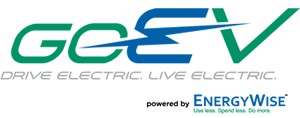FAQs
There are currently around 2,000 electric vehicles (EVs) on Nebraska’s roads today, with the market ready to expand. Electric vehicles are fun to drive and provide significant benefits to consumers and Nebraska’s economy. Is an EV right for you? See why EVeryone’s talking!
ELECTRIC VEHICLES KEEP MONEY IN THE POCKETS OF NEBRASKANS
Fuel efficiency is rated in kilowatt-hours (kWh) per 100 miles rather than miles per gallon. If you pay $0.11 per kWh for electricity and have an average electric vehicle rated at 34 kWh per 100 miles, the cost is about $0.04 per mile. If gas is $3 per gallon and a gas-powered vehicle gets 25 mpg, the cost is about $0.12 per mile. This scenario amounts to a savings of $800 for every 10,000 miles you drive. Clearly, these savings can easily offset the additional cost to purchase an electric vehicle over the vehicle’s lifetime. The U.S. Energy Department has created a website to determine an eGallon, or the cost of fueling a vehicle with electricity compared to a similar vehicle that runs on gasoline.
ELECTRIC VEHICLE MAINTENANCE COSTS ARE SIGNIFICANTLY LOWER
Plug-in electric vehicles typically have lower total cost of ownership and, in particular, lower maintenance costs. This is because they have fewer moving parts, reduced oil changes (or none for a full electric) and fewer brake jobs—battery regeneration absorbs most of the energy. Hybrids and plug-in electric vehicles can go 100,000 miles before receiving a brake job. Visit the Electric Power Research Institute for an electric vehicle cost of ownership report
ALL NEBRASKANS HAVE THE ABILITY TO CHARGE
Electric vehicles can be charged in the comfort of home, avoiding trips to the gas station. They can be charged on a standard 120V wall outlet, also called Level 1 charging. Faster charging can be achieved at home or workplace with Level 2 charging.
CHARGING STATIONS ARE CURRENTLY AVAILABLE ACROSS THE STATE
Public charging stations continue to pop up across Nebraska. Businesses, electric utilities, and government agencies are establishing a rapidly expanding network of charging infrastructure, proving it is possible to get nearly everywhere with an electric vehicle.
ELECTRIC VEHICLES ARE SIGNIFICANTLY BETTER FOR THE LOCAL ECONOMY
EVs are fueled from energy from the local electrical grid, which is cheaper for all consumers. Money spent on local electricity gets reinvested back into the local economy.
ELECTRIC VEHICLES ARE ENERGY EFFICIENT
Electric vehicles convert over 77% of the electrical energy from the grid to power at the wheels. Conventional gasoline vehicles only convert about 12%–30% of the energy stored in gasoline to power at the wheels.*
